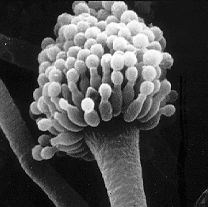Fungi imperfecti
| Fungi imperfecti | |
|---|---|

| |
| Conidiophore of Aspergillus sp. | |
| Scientific classification | |
| Kingdom: | |
The fungi imperfecti or imperfect fungi, also known as Deuteromycota, is a type of fungi. It is not a taxonomic category: they are linked only by their asexuality. The taxonomy of fungi is either based on morphological characteristics (what they look like), or that of biological species. Fungi imperfecti do not fit well into these schemes.
Deueromycota literally means "second fungi", and was once a phylum within the fungi. The fungi in deuteromycota reproduce asexually, or vegetatively: sexual reproduction has never been observed in these species. The term is now used only informally for species of fungi that are asexually reproducing members of the fungal phyla Ascomycota and Basidiomycota.
There are about 25,000 species that have been classified in the deuteromycota and many are basidiomycota or ascomycota. Fungi producing the antibiotic penicillin and those that cause athlete's foot and yeast infections are imperfect fungi. In addition, there are a number of edible imperfect fungi, including the ones that provide the distinctive characteristics of Roquefort and Camembert cheese. Some fungi which are used to develop immunosuppressant drugs, are imperfect fungi. Other imperfect fungi are used for insect pest control.
Other, more informal, names besides Deuteromycota ("Deuteromycetes") and fungi imperfecti, are anamorphic fungi, or mitosporic fungi. None of these names are terms of taxonomic rank. They are convenience terms.
